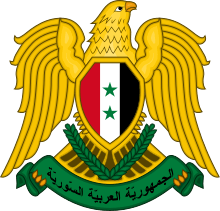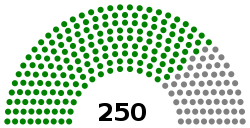People's Council of Syria
Coordinates: 33°31′5″N 36°17′35″E / 33.51806°N 36.29306°E
| People’s Council of Syria مجلس الشعب | |
|---|---|
 | |
| Type | |
| Type | |
| Leadership | |
| Structure | |
| Seats | 250 |
 | |
Political groups |
NPF (200) |
Length of term | 4 years |
| Elections | |
Last election | 13 April 2016 |
Next election | On or before 13 April 2020 |
| Meeting place | |
| Parliament Building, Damascus, Syria | |
| Website | |
| http://parliament.gov.sy/ | |
 |
|---|
| This article is part of a series on the politics and government of Syria |
|
Legislature |
|
The People's Council (Arabic: مجلس الشعب, Majlis al-Sha'ab; French: Assemblée du peuple) is Syria's legislative authority. It has 250 members elected for a four-year term in 15 multi-seat constituencies. There are two main political fronts; the National Progressive Front and Popular Front for Change and Liberation. The 2012 elections, held on 7 May, resulted in a new parliament that, for the first time in four decades, is based on a multi-party system.[2] In 2016 Hadiya Khalaf Abbas, Ph.D., representing Deir Ezzor since 2003, became the first woman elected to be the Speaker.[3][4][5][6] In 2017, Hammouda Sabbagh became the first Orthodox Christian to have held the post.[7]
The council meets at least three times a year and in special occasions called by the council's president or the president of the country.[8]
Latest elections
The last elections were held on the 13th of April, 2016.[9] The elections saw a recording 11,341 candidates seeking to run in the elections, and over 5 million voters out of 8 million eligible cast their votes.[9]
The National Progressive Front won 200 out of 250 seats, 172 of which were for the Ba'ath Party, while 50 Independents held the rest of the seats.
Summary of the 4 April 2016 People's Council of Syria election results
| Parties | Votes | % | Seats | Seats inside |
|---|---|---|---|---|
| National Progressive Front (al-jabha al-waTaniyyah at-taqaddumiyyah) | 200 | |||
|
172 | |||
|
7 | |||
|
2 | |||
|
3 | |||
|
1 | |||
|
1 | |||
|
2 | |||
| Popular Front for Change and Liberation | 0 | |||
| 0 | ||||
| non-partisans | 50 | |||
| Total | 250 | |||
| Source: Syrian parliament | ||||
Names of legislature
The name of the legislature in Syria has changed, as follows, as has the composition and functions:
- Under the Occupied Enemy Territory Administration (1917–1920)
- Syrian National Congress (1919–1920)
- Arab Kingdom of Syria (1920)
- Syrian National Congress (1920)
- State of Syria, part of the French Mandate (1922–1930)
- Constituent Council (1923–1925)
- Constituent Assembly (1924–1930)
- Syrian Republic (1930–58)
- Council of Representatives (1932–1933)
- Chamber of Deputies (1932–1946)
- House of Representatives (1947–1949)
- Constituent Assembly (1949–1951)
- Chamber of Deputies (1953–1958)
- United Arab Republic (1958–1961)
- Chamber of Deputies (1958–1960)
- Syrian Arab Republic (1961–present)
- Chamber of Deputies (1961–1963)
- National Revolutionary Council (1965–1966)
- People's Council (1971–present)
See also
References
- ↑ "Little known Syrian politician elected parliament speaker". Fox News. 28 September 2017. Retrieved 28 September 2017.
- ↑ "Assad says Syria 'able' to get out of crisis". Al Jazeera. 2012-05-25. Retrieved 2012-06-11.
- ↑ Hadiyeh Khalaf Abbas Elected as First Woman Speaker of Syrian People’s Assembly
- ↑ Hadiyeh Khalaf Abbas elected as first woman speaker of People’s Assembly
- ↑ [sana.sy/en/?p=79434 Hadiyeh Khalaf Abbas elected as the first woman Speaker of the People’s Assembly]
- ↑ Syrian Parliament Elects First Woman Speaker Since 1919
- ↑ انتخاب مسيحي أرثوذكسي رئيسًا لمجلس الشعب السوري (in Arabic)
- ↑ Phillips, Douglas A.; Gritzner, Charles F. (2010). Syria. Infobase Publishing. ISBN 9781438132389.
- 1 2 "Assad's party wins majority in Syrian election". France 24. 17 April 2016. Retrieved 22 April 2018.
External links
- People's Council of Syria official government website
- Syria's Legislative System profiles of people and institutions provided by the Arab Decision project
| Wikimedia Commons has media related to People's Council of Syria. |